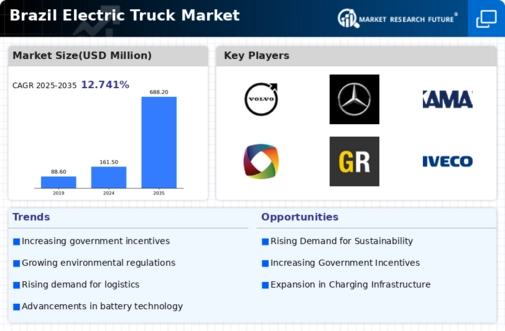Infrastructure Development
Infrastructure development plays a crucial role in the growth of the electric truck market in Brazil. The expansion of charging networks is essential for the widespread adoption of electric trucks. The Brazilian government has initiated several projects to enhance charging infrastructure, with plans to install over 10,000 charging stations by 2027. This development is expected to alleviate range anxiety among fleet operators, making electric trucks a more viable option. Additionally, the integration of renewable energy sources into the charging grid could further reduce operational costs for electric truck fleets. As infrastructure improves, the electric truck market is likely to see increased adoption rates, potentially doubling the number of electric trucks on the road by 2030.
Sustainability Initiatives
The electric truck market in Brazil is experiencing a surge due to increasing sustainability initiatives. The Brazilian government has set ambitious targets for reducing greenhouse gas emissions, aiming for a 37% reduction by 2025. This commitment encourages companies to transition to electric vehicles, including trucks, to meet regulatory requirements. Furthermore, consumers are becoming more environmentally conscious, driving demand for sustainable logistics solutions. As a result, businesses are investing in electric trucks to enhance their green credentials, which is likely to bolster the electric truck market. The market is projected to grow at a CAGR of 20% over the next five years, indicating a robust shift towards eco-friendly transportation solutions.
Corporate Sustainability Goals
Many corporations in Brazil are setting ambitious sustainability goals, which is driving the electric truck market. Companies are increasingly recognizing the importance of reducing their carbon footprint and aligning with global sustainability trends. As part of their corporate social responsibility (CSR) strategies, businesses are investing in electric trucks to enhance their logistics operations. This shift is particularly evident in sectors such as retail and food distribution, where companies are committing to 100% electric fleets by 2030. The electric truck market is likely to benefit from these corporate initiatives, as more companies seek to demonstrate their commitment to sustainability and attract environmentally conscious consumers.
Cost Efficiency and Total Cost of Ownership
Cost efficiency is a significant driver for the electric truck market in Brazil. The total cost of ownership (TCO) for electric trucks is becoming increasingly favorable compared to traditional diesel trucks. With fuel prices fluctuating, electric trucks offer a more stable and lower operational cost, particularly as electricity prices remain competitive. Additionally, maintenance costs for electric trucks are generally lower due to fewer moving parts and less wear and tear. A recent analysis indicates that companies could save up to 30% on TCO by switching to electric trucks. This financial incentive is likely to attract more businesses to invest in electric trucks, thereby propelling the growth of the electric truck market.
Technological Innovations in Electric Vehicles
Technological innovations are significantly influencing the electric truck market in Brazil. Advances in battery technology, such as increased energy density and faster charging capabilities, are making electric trucks more appealing to fleet operators. Brazilian manufacturers are collaborating with tech companies to develop cutting-edge solutions that enhance the performance and efficiency of electric trucks. For instance, the introduction of solid-state batteries could potentially double the range of electric trucks, addressing one of the primary concerns of fleet operators. As these innovations continue to emerge, the electric truck market is expected to expand, with more businesses adopting electric trucks to leverage the benefits of improved technology.
















